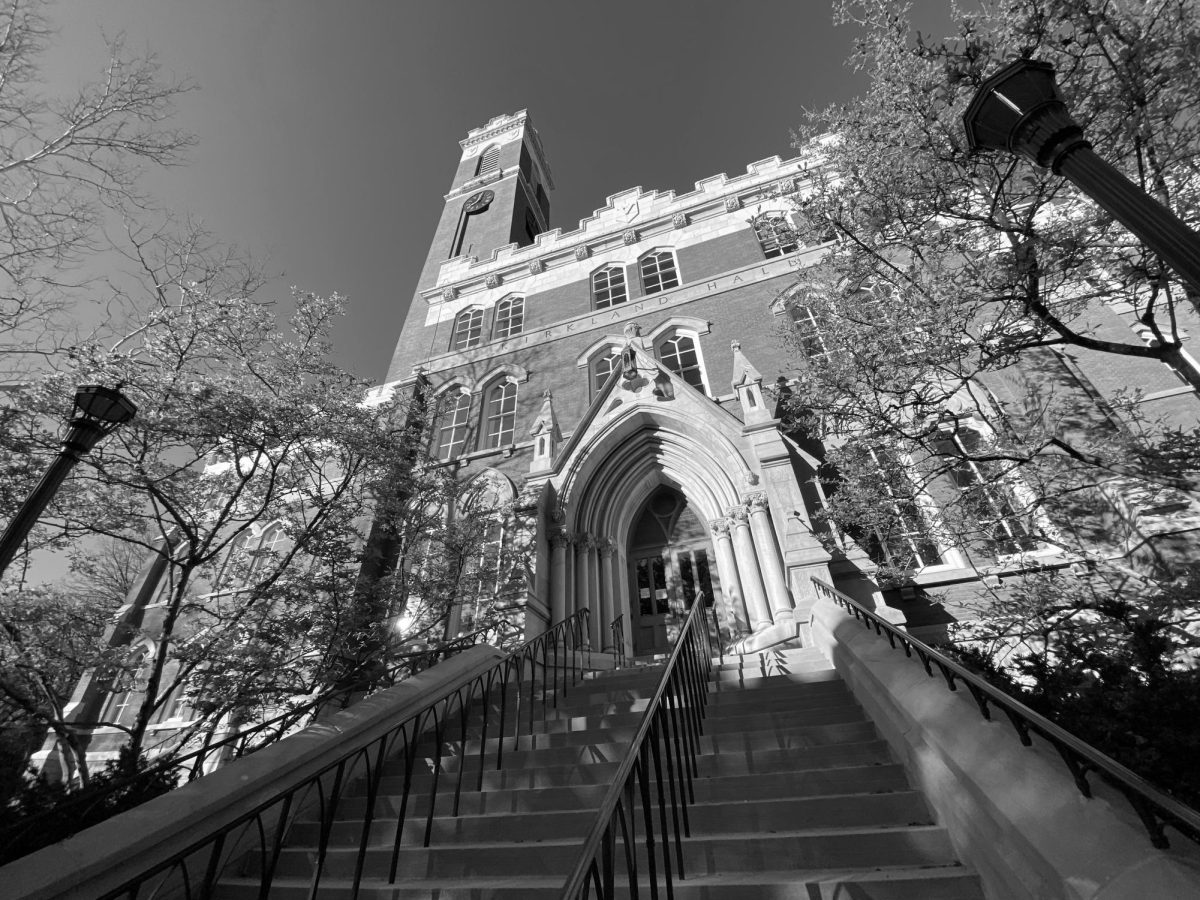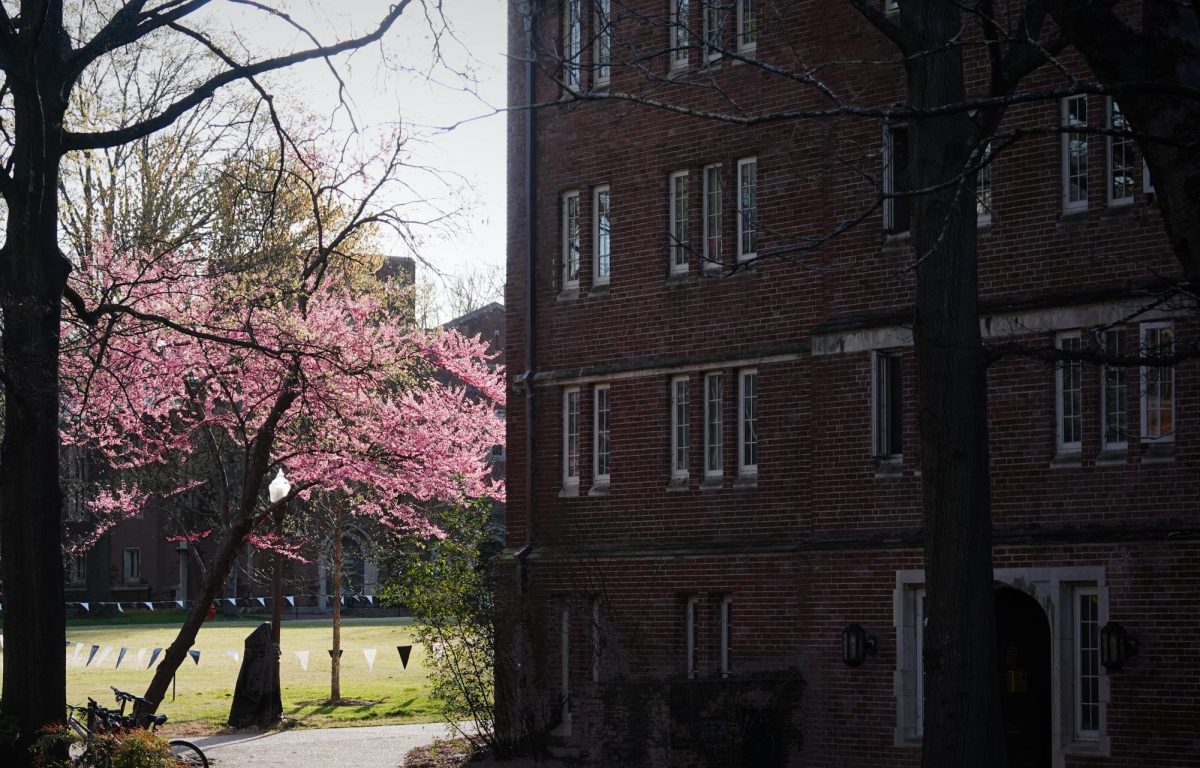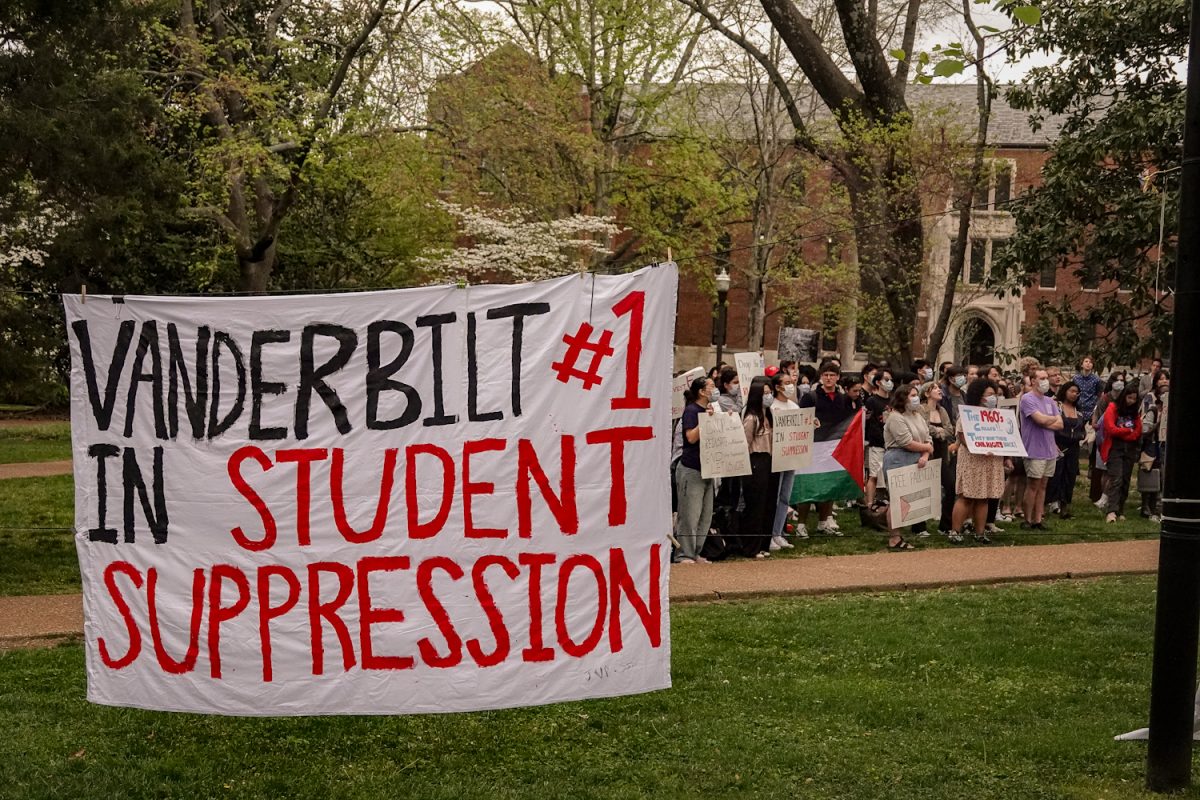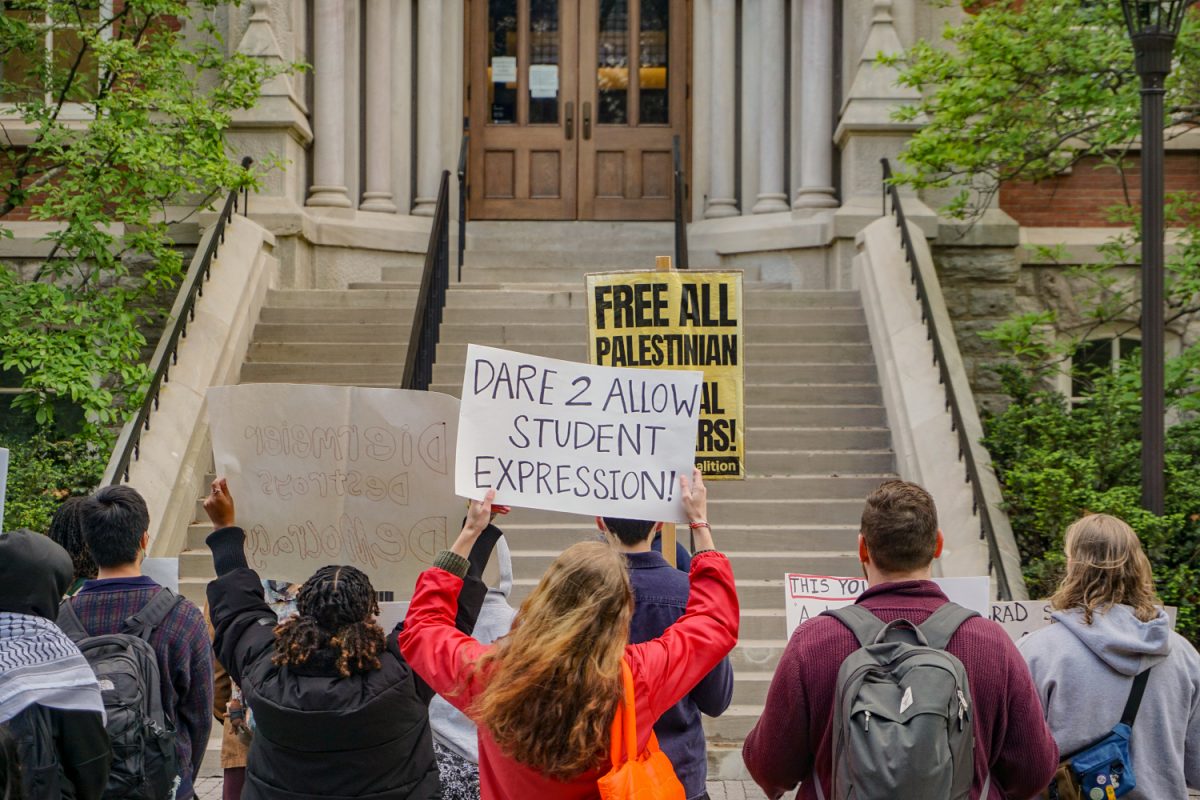UPDATED: This piece was updated on April 6 at 1:17 p.m. CDT to include information and comments shared publicly on X by one of the expelled students.
Three students have been expelled, one suspended and 22 issued disciplinary probations following a week of preliminary hearings involving the 27 students suspended for their involvement in a sit-in protest at Kirkland Hall, according to the Vanderbilt Divest Coalition. In an April 5 email to the Vanderbilt community, Provost C. Cybele Raver shared that students have 10 days to appeal their cases, during which they are permitted access to campus and university resources.
In an open letter to Chancellor Daniel Diermeier, Raver, the Office of General Counsel and Faculty Senate President Andrea Capizzi, faculty members criticized actions taken by the administration throughout the month of March, including the distribution of interim suspensions to student protesters. As of publication, the letter has been signed by 154 professors.
Vanderbilt Law School Associate Professor Terry Maroney, one of the letter’s signees, condemned what she said she and several faculty view as the university’s “overly punitive” disciplinary response.
“Some of us participated in similar sit-ins in our own day; they form part of the protest lexicon. And while such civil disobedience carries consequences, the consequences our administrators have chosen — including expulsion and criminal charges — are draconian,” Maroney said. “We call on the Chancellor to change course.”
Accountability process outcomes
Preliminary hearings began on March 28 and continued through this week. Raver’s email cited the goal of the university’s student conduct policies as ensuring student safety and opportunity for success.
“After a thorough review of the incident, including examination of evidence and interviews with students, the Student Accountability, Community Standards and Academic Integrity staff issued a range of findings and sanctions that took the individual circumstances of each student’s conduct into account,” the email reads.
The university declined to share the specific number of students issued probations, suspensions and expulsions, citing federal privacy laws. However, a joint Instagram post by the Vanderbilt Divest Coalition and Columbia University’s Students for Justice in Palestine chapter made this information publicly available.
“Student disciplinary outcomes are considered part of an individual student’s educational record, the contents of which are protected by federal privacy laws. We cannot release information that would make a student, or group of students, identifiable,” a university representative told The Hustler.
VDC’s post shared that all students issued disciplinary action are filing appeals for their cases. During the 10-day appeal window, students will be able to return to classes and access support for “mental health, academic progress and welfare.”
“All students are going through the appeal process to rectify these grossly oppressive decisions from administration,” the post reads.
First-year Jack Petocz, one of the students issued an expulsion, took to X to condemn the severity of the university’s response.
“Vanderbilt will let sexual assaulters walk free but expel passionate organizers,” Petocz tweeted. “I came to Vanderbilt with the dream of escaping the rampant bigotry and institutional repression I experienced in the Deep South. That dream has soured.”
The coalition has also coordinated a campus-wide walkout for April 8 at 12 p.m. CDT, beginning at Library Lawn. In their post, they criticized Chancellor Daniel Diermeier for being “notoriously cruel to student protestors,” citing his past writings on countering social activism and managing corporate reputations.
Raver thanked the Vanderbilt community for coming together to advance the university’s “educative mission” amid “difficult circumstances.”
“The gravity of this situation and these outcomes weighs heavily on those of us charged with carrying out our responsibility as leaders; we fully understand that student choices and decisions can lead to serious and costly consequences,” her email reads.
Faculty open letter
In the open letter, faculty members said they have been “deeply troubled” by the university’s actions over the past two weeks in response to student protests surrounding the administration’s cancellation of the referendum for the Boycott, Divestment and Sanctions amendment proposed to VSG. The letter was publicly signed by 105 faculty members, with an additional 49 who chose to remain anonymous.
“We hold a range of perspectives on this topic and on the BDS campaign at the heart of the recent protests,” the letter reads. “However, in our shared view, the administration’s response to student activism on this issue is inconsistent with Vanderbilt’s commitment to free speech and expression in a democratic society.”
The faculty expressed concern for the “suppression of student activism and speech” on campus, saying that the university has restricted student actions in ways that are “excessive and punitive.”
“The administration has confined student expression to a dwindling number of bulletin boards, locations and approved time slots, with implications that should alarm the Vanderbilt community,” the letter reads.
The letter also acknowledges the correspondence sent to Diermeier by the Metropolitan Council of Nashville, as well as the arrest of Nashville Scene reporter Eli Motycka.
“We are troubled that the administration’s suppression of student speech on campus and its treatment of a peaceful journalist have threatened Vanderbilt’s standing and reputation within the broader Nashville community and possibly beyond,” the letter reads.
The faculty members expressed support for students involved in the protests over the past month, condemning the university’s “implied characterization” of the protests as a threat to safety.
“We call on the administration to repeal all suspensions and criminal charges against the students and immediately reinstate their access to campus housing, meal plans, healthcare, and educational activities,” the letter reads. “Finally, we urge the administration to align its policies with its values regarding free speech, expression, and democratic activities, including protest.”
Assistant Professor of Anthropology Carwil Bjork-James expressed disappointment with the way the university responded to the protestors who participated in the sit-in, saying he believes leaders in a democracy should be open to disagreements.
“Chancellor Diermeier met our students not with dialogue but with security guards. And now the university has responded to a time-honored protest tactic, the sit-in, with punishment and expulsion,” Bjork-James said. “Our students stood up during a moral crisis, and we are failing them.”















Robert Stockton • Apr 29, 2024 at 7:06 am CDT
I am an alumnus. Any demonstration dealing with HATE because of religious or racial differences or the elimination of a country is wrong and should be dealt with severely.
Hal Brody • Apr 17, 2024 at 7:53 am CDT
Is trespass and refusing to leave private property after repeated requests to leave a protected, time-honored method of protest? I don’t think so.
Francesca • Apr 13, 2024 at 11:42 am CDT
Sounds like a bunch of whiney kids who don’t like the consequences to their actions. Way to go Vandy, don’t back down.
You need to choose your students a little more wisely.
RickPerconte • Apr 10, 2024 at 7:19 am CDT
I’m so sympathetic, understanding and kind that I would give the signers of the open letter the choice to recant or be fired.
Mike Jefferson • Apr 10, 2024 at 5:42 am CDT
“Vanderbilt will let sexual assaulters walk free but expel passionate organizers,” Advocating genocide, threatening others, and disrupting operations is hardly “passionate organizers.” This BS is akin to calling the BLM riots where 100’s of millions of dollars of property were looted and destroyed, and nearly 100 people were murdered, “peaceful protests”
Jack • Apr 10, 2024 at 5:06 am CDT
Prosecute the students who assaulted the security guard. Which is clear, and beyond dispute, from the video.
Spock • Apr 10, 2024 at 2:07 am CDT
“passionate organizers”… a la Barack Hussein 0bama and his “fundamental transformation” community-organizing…
T Herman Zweibel • Apr 9, 2024 at 10:14 pm CDT
Kudos to Vandy for getting rid of this Jack Pedos guy and others of his ilk! Let’s hope campus functionaries at other schools grow spines and kick out the other ne’er-do-wells.
Joe E • Apr 10, 2024 at 2:55 pm CDT
More schools should take this lesson and replicate it. As soon as little Johnny has to tell mommy and daddy that their 50k school tuition is gone and they are expelled, these brats will think twice about how they comport themselves.
Kulsum Hafeez • Apr 9, 2024 at 9:51 am CDT
This is shameful, and an insult to the free thought and intellectual discourse that should be the cornerstone of academia, and the rich history of peaceful civil protest led by our country’s universities during every single major civil and human rights event in our history. It is a sad day in America when academia bows to politics and money. Shame on Vanderbilt leadership.
Robert • Apr 10, 2024 at 5:40 am CDT
The people calling this free speech issue are the same ones that prevent anyone else from expressing an idea that they disagree with. Everyone can see this but those in academia. Good luck in the job market. You’re going to need it.
Your Vanderbilt Colleague • Apr 9, 2024 at 7:51 am CDT
Urging the university to reinstate students, including the three who assaulted a staff member and the fourth who is charged with vandalism, demonstrates a lack of critical thinking and a lack diligence in collecting information on the part of the faculty who wrote and signed the open letter referenced in this article.
Politics and rights to assemble and speak have no bearing on this matter. In no circumstance is it acceptable to assault staff and vandalize a building. As an employee at this university, I need to know that the administration will provide for my basic safety and hold accountable those who threaten it. It is absolutely shameful that the faculty buffoons who signed this letter do not demonstrate any understanding of the nuances of this situation and fail to comprehend the fundamental need for employee safety.
Politics and posturing over serious scholarship and engagement is understandable among undergraduates. When the faculty do it, it is just pathetic and embarrassing to the university.
Connor • Apr 7, 2024 at 11:44 pm CDT
All this bickering over whether the punishments are justified, but no one actually knows why these specific students were expelled. The students simply claim they were “peacefully protesting,” and that was why they were expelled. That is a highly subjective claim. I think it’s fair to say that most people would not describe what is on video as being a “peaceful protest,” *and also* that most people would likely think that it doesn’t warrant expulsion. And since most other students were “peacefully protesting” with them and received probation instead of expulsion, it stands to reason that there is more to their individual cases.
None of the students have given complete transparency to all of the things that Vanderbilt litigated in their student accountability hearings. We don’t know what evidence there was and, crucially, we don’t even know what they were accused of! For all we know, the students that received harsher punishments could have been making credible threats of violence, committed hate speech, injured someone, vandalized property, or any number of things. The fact that those students are not being forthcoming about what exactly Vanderbilt accused them of speaks volumes. And obviously, the university is not going to comment on a specific student’s allegations, even if it would deflect criticism. I don’t think it would be wise for anyone to stand up and defend these kids at this point – if their actions were clearly defensible, they would likely have outlined them in detail already, either online or to the press.
Kenneth Thomas • Apr 8, 2024 at 1:17 pm CDT
Physically roughing up a security officer (a low-paid, from what I could tell African-American) employee, then picking them up and manhandling them across the room, probably rises to felony assault if the ultra-left DA wanted to pursue it.
(The employee has grounds for a substantive civil suit).
“Most people” are not very bright, and may not realize that level of violence (not to mention the entitlement and other problems it displays) is a serious crime, and more than grounds for expulsion.
Not even taking into account the other objectionable aspects of a group which advocates terrorists engaging in whatever this was.
Connor • Apr 8, 2024 at 11:01 pm CDT
Obviously, most people would watch the video and say it was assault. Because it clearly was – those students have ZERO hope of slipping out of the charges if the prosecutor chooses to pursue them. Especially if it caused injury (I have seen conflicting reports about whether they were charged with assault and bodily injury or just assault).
That also relates back to my other point about how dodgy the students have been about the accusations they’ve faced. The student referenced in this article posted this carefully phrased claim on X: “I did not touch a community service officer, nor am I anywhere near the individual in the video.” Which raises even *more questions* – he was charged with assault and held on a higher bond than the other two charged with assault. If this isn’t a lie, it seems to suggest his assault charge was actually a separate victim. Why doesn’t he share what he was charged with and refute it with facts?
You are most likely right, in hindsight. The majority of people (with no bias or context) would watch that video and say that expulsion is an acceptable punishment. And the response from pretty liberal corners of the internet has shown that – there aren’t a lot of people siding with them.
Rob • Apr 7, 2024 at 10:12 pm CDT
Having now spent more than $300,000 of our very hard earned money on education at Vanderbilt for our child, I am feeling better about it all the time.
I have watched with consternation at what is happening around our country as some of the most privileged, spoiled and unruly students riot and destroy property. The goal appears to be the of overthrow civil society by intimidating those who disagree with them. Many universities have looked the other way, tolerated, and encouraged this behavior — I’m so happy Vanderbilt is not taking that approach.
I expect our Universities to train intelligent free-thinking citizens tolerant of other opinions who can argue their cases without resorting to such pathetic and laughable behavior as the “Vanderbilt 25” exhibited.
I applaud the Vanderbilt administration for holding students individually accountable for their actions and hope the expulsions and suspensions stand — being at Vanderbilt is a privilege and some should lose that on the basis of their actions. Protesting is a right and maintaining free speech rights is critically important, but breaking and entering, damaging campus property, and physically and verbally assaulting guards / police is unacceptable and I stand in support of the Administration.
Thank you Chancellor Diermeier and team. You have our support.
Olaf • May 1, 2024 at 12:02 pm CDT
Agree 100% We’re so delighted our GDaughter chose Vandy over woke Ivy League Schools, now in disarray. Hats off to Vandy. The video says it all & bad apples deserve consequences of their actions. I only hope the Ivy Leagues don’t r recruit our Vandy Chancellor for his exceptional leadership when they’ve failed dismally.
Lev D. Zilbermints • Apr 7, 2024 at 10:02 pm CDT
My name is Lev D. Zilbermints. I do not agree with the BDS philosophy, because Israel like any other country, has a right to exist. That being said, I do not agree with the approach the administration of Vanderbilt University has taken. Suspensions? Expulsions? For what? Free speech? What is going on?
I participated in a sit-in at Rutgers University – Newark, back in 2005. We protested against racist police on campus. No one arrested anybody. In fact, the administration came and talked to us. Our demands were met and the issues were resolved peacefully. Rutgers even got an African American police chief. Seven racist cops resigned.
As I said, I disagree with the BDS position towards Israel. That does not stop me, however, from supporting the students’ right to free speech. Sit-ins have been a time-honored demonstration of protest since 1960. As long as it is done peacefully, without violence, the sit-in is an expression of the First Amendment.
Assuming what is reported about the administration is accurate, this school needs to stand up for the First Amendment. We live in America, not Russia, Iran or North Korea.
I suggest you contact F.I.R.E. for help. That organization fights for the First Amendment.
Guest • Apr 8, 2024 at 9:57 am CDT
It might be useful to understand a key difference between Rutgers (a state university)and Vanderbilt (a private university). The First Amendment relates to government control of speech. It also does not provide a get-out-of-jail-free card for shoving, blocking, or using racial epithets.
Kenneth Thomas • Apr 8, 2024 at 3:18 pm CDT
Can you point us to any evidence of the use of racial epithets? I looked through the video from the Scene and did not notice that. It would certainly be a very concerning thing.
James Brooks • Apr 8, 2024 at 4:46 pm CDT
Not exactly epithets but video of protestors shaming a black man for not siding with them:
https://www.reddit.com/r/Destiny/s/mEICrbYAXy
Barry • Apr 10, 2024 at 8:06 am CDT
You can have sit ins all you want. Just don’t attack the security like the ones expelled.
Lev D. Zilbermints • May 22, 2024 at 3:45 pm CDT
That is just it. We at Rutgers did not attack security. What we protested was racist behavior by Rutgers security towards students.
Anonymous • Apr 7, 2024 at 9:36 pm CDT
But will the students learn?
Nexus • Apr 10, 2024 at 6:51 pm CDT
Magic 8-ball says:
‘Not Likely’.
Jeff Finkelstein • Apr 7, 2024 at 4:12 pm CDT
Actions have consequences.
Wokeness has its limitations.
Congrats to the administration.
Robin • Apr 7, 2024 at 2:47 pm CDT
The security guards wouldn’t have been necessary had they not chosen to break into Kirkland! A truly ‘peaceful protest’ would not have involved breaking and entering…it is a privilege to attend any university… and if you want to protest and be heard that’s great… but you don’t get to break the rules in the process and not feel the consequences…. live and learn and grow….
Dean • Apr 7, 2024 at 1:20 pm CDT
The student that made physical contact with the security guards were expelled..at least they weren’t arrested and held for a year without representation for misdemeanor tresspassing
Spock • Apr 10, 2024 at 2:15 am CDT
Yes, J6 are political prisoners on America’s path to total totalitarian subjugation. God forbid.
PDJT ‘24.
Personnel is policy. We must drain the swamp, the 5th column, America’s enemy-within.
C Loie • Apr 7, 2024 at 11:34 am CDT
Thank you Chancellor Diermeier!
Kathy Cash • Apr 7, 2024 at 8:03 am CDT
Anyone notice the organized campus walkout to protest these sanctions coincides with the eclipse? Coincidence… I think not.
Nacho • Apr 6, 2024 at 8:49 pm CDT
The thing about civil disobedience is that by definition, it invites and welcomes punishment by authority to signify disdain for that authority. One breaks the rules to demonstrate that those rules, and the authority that enforces them, mean less than making one’s point.
In short, if you’re unwilling to incur punishment and suffer the consequences of your actions, you either haven’t thought those actions through or don’t believe as strongly in your motivating principles as you claimed.
The protesters entered illegally, used force against a school employee and then used force (in the form of passive and occasionally active resistance) to occupy and prevent access to a school facility. They did so to draw attention to their cause and try to spur a change. They drew attention to their cause, spurred no change and now have to suffer the consequences of their actions. If they truly believe their cause to be just, they have no cause for complaint.
Well done • Apr 6, 2024 at 1:37 pm CDT
Accountability. Based.
angry vanderbilt student • Apr 6, 2024 at 11:47 am CDT
Vanderbilt expelled James Lawson in the 1960s. Sad to see they choose to stand on the wrong side of history again.
Kenneth Thomas • Apr 7, 2024 at 3:57 pm CDT
Did James Lawson participate in a felony assault and other serious crimes?
( for that matter, did the otherwise insignificant Law professor spit on returning troops, break into buildings, and commit other crimes in what she calls “nonviolent protests?” )